七下英语第十一单元教案
新人教版七年级英语下册Unit11教案
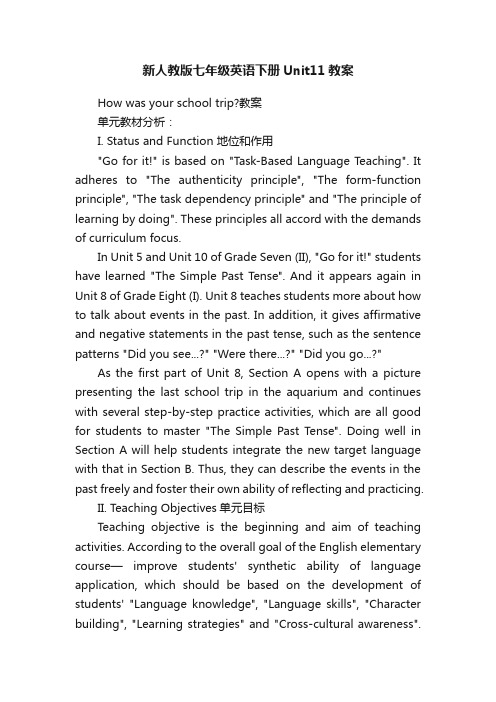
新人教版七年级英语下册Unit11教案How was your school trip?教案单元教材分析:I. Status and Function 地位和作用"Go for it!" is based on "Task-Based Language T eaching". It adheres to "The authenticity principle", "The form-function principle", "The task dependency principle" and "The principle of learning by doing". These principles all accord with the demands of curriculum focus.In Unit 5 and Unit 10 of Grade Seven (II), "Go for it!" students have learned "The Simple Past Tense". And it appears again in Unit 8 of Grade Eight (I). Unit 8 teaches students more about how to talk about events in the past. In addition, it gives affirmative and negative statements in the past tense, such as the sentence patterns "Did you see...?" "Were there...?" "Did you go...?"As the first part of Unit 8, Section A opens with a picture presenting the last school trip in the aquarium and continues with several step-by-step practice activities, which are all good for students to master "The Simple Past Tense". Doing well in Section A will help students integrate the new target language with that in Section B. Thus, they can describe the events in the past freely and foster their own ability of reflecting and practicing.II. Teaching Objectives单元目标Teaching objective is the beginning and aim of teaching activities. According to the overall goal of the English elementary course—improve students' synthetic ability of language application, which should be based on the development of students' "Language knowledge", "Language skills", "Character building", "Learning strategies" and "Cross-cultural awareness".The teaching objectives are described as follows:(I). Knowledge objectivesi. Master the simple past tense of regular and irregular verbsii. Recite the new words and expressions about the last school trip in the aquarium, including their pronunciation and intonationiii. Master the key sentences and learn how to talk about the past events(II). Ability objectivesi. Understand the two dialogues and gain the information to foster the listening skillsii. Use the discourse markers to organize sentences together to form a short story and interview others to foster the speaking skillsiii. Understand the reading material and find the answers on the wall to foster the reading skills iv. Write down the correct sentences to foster the writing skills1. 学习询问和谈论过去发生的事情。
人教版七下英语unit11 教案
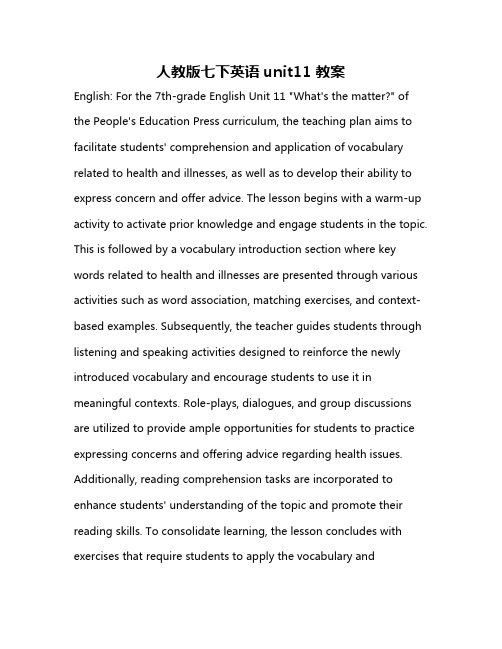
人教版七下英语unit11 教案English: For the 7th-grade English Unit 11 "What's the matter?" of the People's Education Press curriculum, the teaching plan aims to facilitate students' comprehension and application of vocabulary related to health and illnesses, as well as to develop their ability to express concern and offer advice. The lesson begins with a warm-up activity to activate prior knowledge and engage students in the topic. This is followed by a vocabulary introduction section where key words related to health and illnesses are presented through various activities such as word association, matching exercises, and context-based examples. Subsequently, the teacher guides students through listening and speaking activities designed to reinforce the newly introduced vocabulary and encourage students to use it in meaningful contexts. Role-plays, dialogues, and group discussions are utilized to provide ample opportunities for students to practice expressing concerns and offering advice regarding health issues. Additionally, reading comprehension tasks are incorporated to enhance students' understanding of the topic and promote their reading skills. To consolidate learning, the lesson concludes with exercises that require students to apply the vocabulary andstructures learned in creative writing tasks or situational prompts. Throughout the lesson, multimedia resources, including audio recordings, visual aids, and interactive activities, are employed to cater to diverse learning styles and enhance engagement. The teaching plan is designed to foster a communicative and interactive learning environment where students feel motivated to participate actively and develop both their linguistic and interpersonal skills.中文翻译: 《人教版七年级英语第十一单元“怎么了?”的教学计划旨在帮助学生理解和运用与健康和疾病相关的词汇,并发展他们表达关心和提供建议的能力。
人教版七年级英语下册第十一单元教学设计
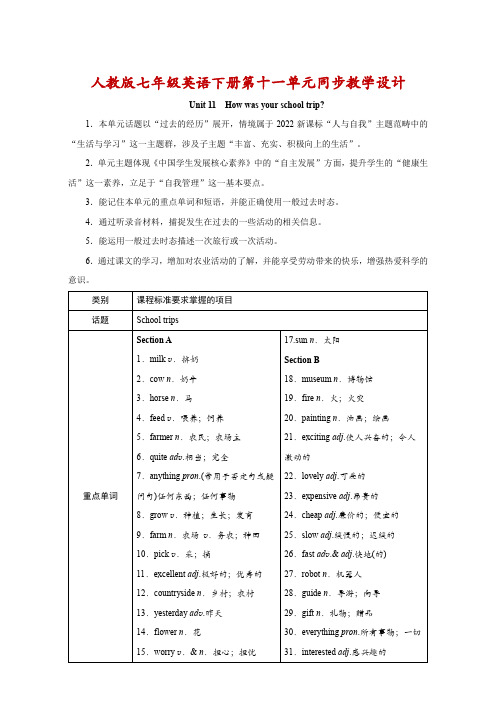
人教版七年级英语下册第十一单元同步教学设计Unit 11How was your school trip?1.本单元话题以“过去的经历”展开,情境属于2022新课标“人与自我”主题范畴中的“生活与学习”这一主题群,涉及子主题“丰富、充实、积极向上的生活”。
2.单元主题体现《中国学生发展核心素养》中的“自主发展”方面,提升学生的“健康生活”这一素养,立足于“自我管理”这一基本要点。
3.能记住本单元的重点单词和短语,并能正确使用一般过去时态。
4.通过听录音材料,捕捉发生在过去的一些活动的相关信息。
5.能运用一般过去时态描述一次旅行或一次活动。
6.通过课文的学习,增加对农业活动的了解,并能享受劳动带来的快乐,增强热爱科学的意识。
续表【课时建议】本单元建议5课时Section A (1a-1c)(一课时)Section A (2a-2d)(一课时)Section A (Grammar Focus-3b)(一课时)Section B (1a-1d)(一课时)Section B (2a-Self Check)(一课时)词汇短语:主要采用图片及多媒体展示记忆法。
基本句子:采用多媒体展示及交际法(利用多媒体展示两人进行交际时的情景)。
语法:一般过去时。
第一课时Section A (1a-1c)Step 1情景导入【参考案例】First, teacher lists some verbs on the blackboard:go,milk,ride,feed,talk,take,am,are…Then,ask students to change the words into the past forms together:went,milked,rode,fed,talked,took,was,were…Next,ask the students to read the past forms aloud.Teacher:Good morning, everyone! Did you have a good school trip?What did you do on your school trip?You can talk about it with your deskmates. Please pay attention to the forms of e past forms to express the actions in the past.设计意图:先讲解动词过去式的构成与读音,让学生掌握动词过去式的构成与读音规律,再向学生询问学校旅行的情况,并让学生交流学校旅行的感受,由易到难,循序渐进,环环相扣。
人教版七年级英语下册第十一单元同步教学设计
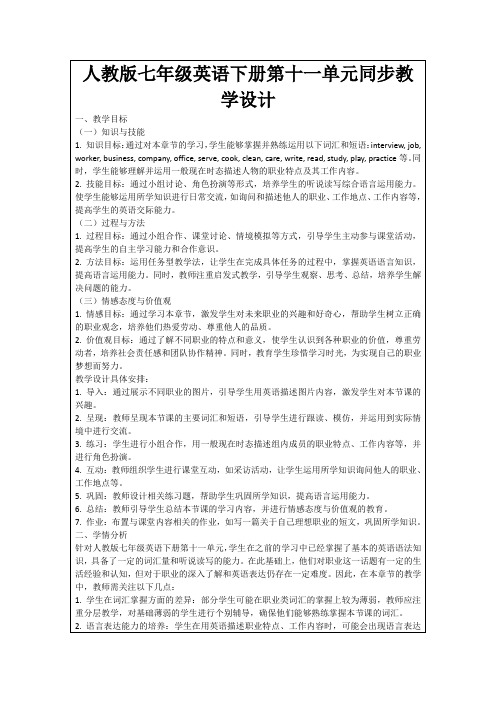
1.教学内容:对本节课的职业话题、词汇、语法等进行总结。
2.教学实施:教师引导学生回顾本节课所学内容,总结一般现在时态描述职业特点的用法,以及相关词汇和短语。
3.目标达成:通过总结归纳,帮助学生巩固所学知识,形成知识体系,提高他们的英语素养。
在教学过程中,教师应注重学生的主体地位,充分调动他们的学习积极性,关注学生的个体差异,进行分层教学。同时,教师要以人为本,关注学生的情感态度,培养他们正确的价值观。通过本节课的学习,使学生能够熟练掌握职业相关词汇,提高英语听说读写综合能力。
3.练习:学生进行小组合作,用一般现在时态描述组内成员的职业特点、工作内容等,并进行角色扮演。
4.互动:教师组织学生进行课堂互动,如采访活动,让学生运用所学知识询问他人的职业、工作地点等。
5.巩固:教师设计相关练习题,帮助学生巩固所学知识,提高语言运用能力。
6.总结:教师引导学生总结本节课的学习内容,并进行情感态度与价值观的教育。
人教版七年级英语下册第十一单元同步教学设计
一、教学目标
(一)知识与技能
1.知识目标:通过对本章节的学习,学生能够掌握并熟练运用以下词汇和短语:interview, job, worker, business, company, office, serve, cook, clean, care, write, read, study, play, practice等。同时,学生能够理解并运用一般现在时态描述人物的职业特点及其工作内容。
3.情感态度的引导:学生在对待不同职业的态度上可能存在偏见,教师需关注学生的情感态度,引导他们尊重各种职业,培养正确的价值观。
4.合作学习能力的提升:本章节的教学过程中,小组合作和角色扮演等活动较多,教师应关注学生在合作学习中的表现,提高他们的团队协作能力和沟通能力。
【精选】人教版七年级下册英语Unit11第十一单元优秀教案
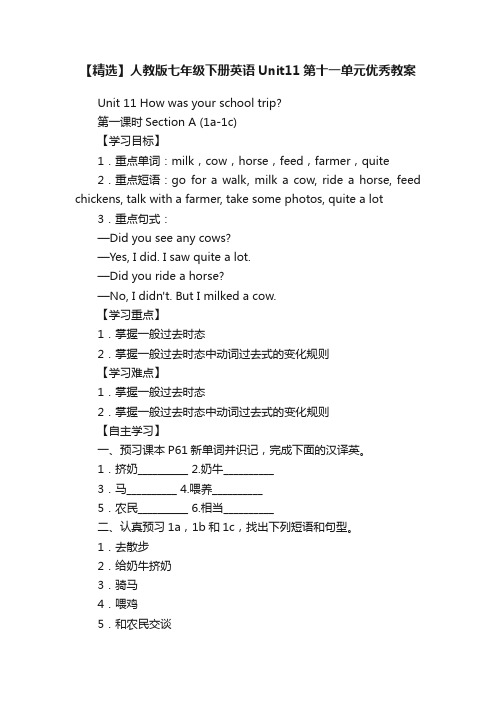
【精选】人教版七年级下册英语Unit11第十一单元优秀教案Unit 11 How was your school trip?第一课时Section A (1a-1c)【学习目标】1.重点单词:milk,cow,horse,feed,farmer,quite2.重点短语:go for a walk, milk a cow, ride a horse, feed chickens, talk with a farmer, take some photos, quite a lot 3.重点句式:—Did you see any cows?—Yes, I did. I saw quite a lot.—Did you ride a horse?—No, I didn't. But I milked a cow.【学习重点】1.掌握一般过去时态2.掌握一般过去时态中动词过去式的变化规则【学习难点】1.掌握一般过去时态2.掌握一般过去时态中动词过去式的变化规则【自主学习】一、预习课本P61新单词并识记,完成下面的汉译英。
1.挤奶__________ 2.奶牛__________3.马__________ 4.喂养__________5.农民__________ 6.相当__________二、认真预习1a,1b和1c,找出下列短语和句型。
1.去散步2.给奶牛挤奶3.骑马4.喂鸡5.和农民交谈6.照一些相片7.你见过奶牛吗?是的,我见过很多。
8.你骑过马吗?没有,但是我给奶牛挤过奶。
【课堂导学】Step 1情景导入Teacher:We had a school trip last week, did you have a good time? How was your school trip?Students:Not bad/Pretty good/Great/Terrible.Teacher:Did you take any photos? Did you feed chickens? What did you do? Please tell us what you did.Do you want to know what Carol did?环节说明:以上周的校游为话题,引出一般过去时态,简洁明了,直奔主题。
人教版初中英语七年级下册Unit11SectionB(1a1d)优秀教学案例
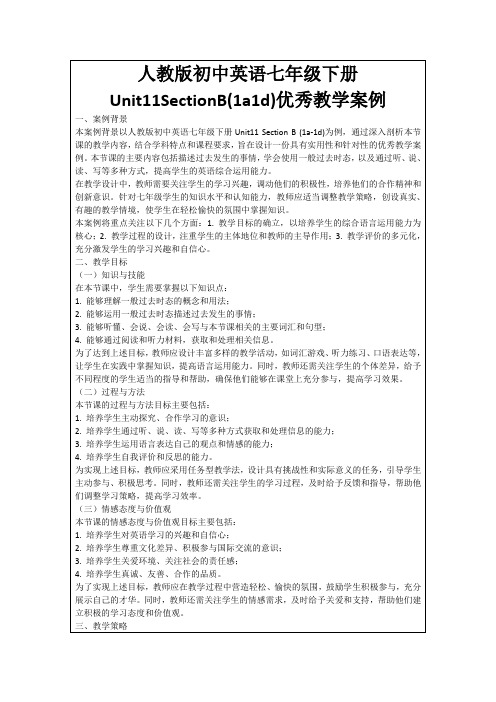
作业小结是教学过程中的重要环节,能够帮助学生巩固所学知识,提高他们的自主学习能力。在课堂教学结束后,教师可以布置一些与本节课相关的一般过去时态的作业,如写一篇关于过去经历的短文、完成一些语法练习等。同时,教师还可以鼓励学生在课后与同学互相练习一般过去时态,提高他们的语言运用能力。
五、案例亮点
在教学设计中,教师需要关注学生的学习兴趣,调动他们的积极性,培养他们的合作精神和创新意识。针对七年级学生的知识水平和认知能力,教师应适当调整教学策略,创设真实、有趣的教学情境,使学生在轻松愉快的氛围中掌握知识。
本案例将重点关注以下几个方面:1.教学目标的确立,以培养学生的综合语言运用能力为核心;2.教学过程的设计,注重学生的主体地位和教师的主导作用;3.教学评价的多元化,充分激发学生的学习兴趣和自信心。
3.小组合作:教师将学生分成小组,让他们在小组内进行讨论和互动。这种小组合作的方式能够培养学生的团队合作精神,提高他们的语言运用能力。
4.反思与评价:教师让学生互相评价,指出对方的优点和需要改进的地方。这种反思与评价的方式能够帮助学生了解自己的学习情况,提高他们的自我认知能力。
5.教学内容与过程:教师在教学过程中注重知识的系统性和实践性,通过讲解、练习和讨论等多种方式,帮助学生全面理解和掌握一般过去时态的用法。此外,教师还注重培养学生的团队合作精神和自主学习能力,通过小组讨论和作业小结等环节,提高他们的语言运用能力。
1.情景创设:本节课通过多媒体展示图片、视频,以及讲述故事等方法,将学生带入一个过去的情境中,让他们在情境中感受和理解一般过去时态的用法。这种情景创设的方式不仅能够激发学生的学习兴趣,还能够提高他们的语言实践能力。
2.问题导向:教师在教学过程中提出了许多问题,引导学生运用过去时态进行回答。这种问题导向的教学策略能够激发学生的思考,培养他们解决问题的能力。
外研版七下英语module11单元整体教案设计
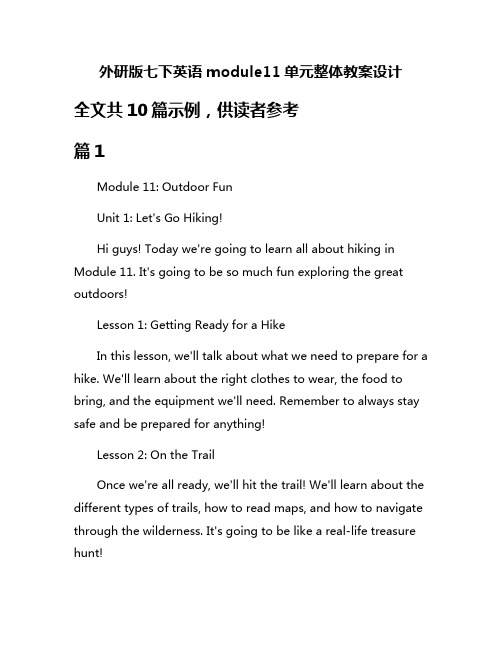
外研版七下英语module11单元整体教案设计全文共10篇示例,供读者参考篇1Module 11: Outdoor FunUnit 1: Let's Go Hiking!Hi guys! Today we're going to learn all about hiking in Module 11. It's going to be so much fun exploring the great outdoors!Lesson 1: Getting Ready for a HikeIn this lesson, we'll talk about what we need to prepare for a hike. We'll learn about the right clothes to wear, the food to bring, and the equipment we'll need. Remember to always stay safe and be prepared for anything!Lesson 2: On the TrailOnce we're all ready, we'll hit the trail! We'll learn about the different types of trails, how to read maps, and how to navigate through the wilderness. It's going to be like a real-life treasure hunt!Lesson 3: Camping OutAfter a long day of hiking, it's time to set up camp. We'll learn how to pitch a tent, build a fire, and cook our meals outdoors. Camping is such a fun way to spend time with friends and family!Lesson 4: Nature WalkIn our final lesson, we'll go on a nature walk to explore the plants and animals around us. We'll learn about the different types of trees, flowers, and animals that live in the wilderness. It's incredible to see all the beauty of nature up close!I hope you guys are as excited as I am for Module 11! Let's get ready for some outdoor fun and adventure!篇2As a primary school student, I am going to share with you the overall lesson plan for Module 11 of the New Standard English textbook for Grade 7. This module covers various topics related to travel and transportation. Here is a breakdown of the lesson plan:1. Lesson 1: Introducing the topic of travel- Start the lesson by discussing different modes of transportation such as cars, trains, planes, and ships.- Teach vocabulary related to travel such as "driver," "pilot," "conductor," and "captain."- Have students participate in a group discussion about their favorite mode of transportation and why they like it.2. Lesson 2: Planning a trip- Introduce key phrases and vocabulary related to planning a trip such as "book a ticket," "make a reservation," and "check in."- Have students work in pairs to plan a holiday trip to a destination of their choice, using the vocabulary they have learned.- Encourage students to present their trip plans to the class and explain why they chose that destination.3. Lesson 3: Talking about travel experiences- Discuss different travel experiences such as going on a road trip, taking a cruise, or flying to a new country.- Teach vocabulary related to travel experiences such as "sightseeing," "try new foods," and "take photos."- Have students share their own travel experiences with a partner and then write a short paragraph about their favorite travel experience.4. Lesson 4: Cultural exchange- Introduce the concept of cultural exchange and how travel can help us learn about different cultures.- Teach vocabulary related to cultures such as "traditions," "customs," and "festivals."- Have students research a cultural festival from a different country and present their findings to the class, including information about the festival and why it is important in that culture.5. Lesson 5: Review and assessment- Review key vocabulary and phrases from the module through a fun quiz or game.- Assess students' understanding of the module by having them complete a written quiz or oral presentation on the topics covered in the lessons.- Provide feedback to students on their performance and progress in the module.Overall, this module aims to engage students in learning about travel and transportation in a fun and interactive way, while also helping them develop their language skills in English. I hope this lesson plan overview has been helpful for you!篇3Module 11 Unit Overall Teaching PlanHello everyone! Today I'm going to tell you all about the teaching plan for Module 11 in our English textbook. Are you ready? Let's go!First, we will start with the Warm-up activity. In this activity, we will review the vocabulary and phrases from the previous units. We will play games like "Simon Says" or "Word Bingo" to make it fun and engaging.Next, we will move on to the Input section. In this part of the lesson, our teacher will introduce new words and phrases related to the theme of the unit. We will learn how to use these words in sentences and practice pronunciation.After that, it's time for the Practice activities. We will work in pairs or groups to complete tasks like role-plays, interviews, orgames that help us practice the new language in a meaningful way.In the Production section, we will use what we have learned to create our own dialogues, stories, or presentations. This is where we get to show off our language skills and be creative!Finally, we will end the lesson with a Review and Reflection activity. We will go over everything we have learned in the unit and think about how we can improve our English skills going forward.And that's it! That's our overall teaching plan for Module 11.I hope you're excited to learn and have fun in our English class. Let's work hard and become English superstars together! Bye bye!篇4Hello everyone! Today I'm going to share with you the whole lesson plan of Module 11 from the English textbook "My New World" in Grade 7 of the Shang Hai Edition.1. Warm-up: To start off the lesson, we can have a quick review of the previous lesson by asking some questions related to the topic of animals and their habitats. We can also sing asong about animals to get the students engaged and excited for the lesson.2. Introduction: Introduce the new topic of the lesson, which is about different countries and cultures around the world. Show pictures of different countries and ask students to guess where they are from.3. Vocabulary Building: Introduce new words related to countries and cultures, such as country, continent, language, flag, etc. Use flashcards and pictures to help students understand the meanings of these words.4. Reading: Read a short passage about a student who travels around the world and learns about different cultures. Ask comprehension questions to check students' understanding of the text.5. Speaking Practice: Divide the students into pairs or groups and ask them to discuss the different customs and traditions of their own countries. Encourage them to share their experiences and learn from each other.6. Listening Comprehension: Play an audio recording of people from different countries speaking different languages.Ask students to listen carefully and try to guess which country the speakers are from.7. Writing Activity: Ask students to write a short paragraph about a country they would like to visit and why. Encourage them to use the vocabulary words they have learned in the lesson.8. Review and Assessment: Review the new vocabulary words and concepts introduced in the lesson. Have a short quiz to assess students' understanding of the material covered.9. Homework: Assign homework to reinforce what was learned in the lesson, such as writing a postcard from a foreign country or researching a country of their choice and presenting it to the class.I hope you enjoy this lesson plan and find it helpful for teaching Module 11 of the Shang Hai Edition Grade 7 English textbook. Have fun learning about different countries and cultures!篇5Module 11 Unit PlanHey everyone! Today I'm going to tell you all about our next English class. We are going to learn all about different countries and cultures in Module 11 of our English textbook.Lesson 1: Introducing CountriesIn this lesson, we will learn the names of different countries and some basic facts about them. We will also practice how to say where we are from. Get ready to learn some new words and have fun practicing with your classmates!Lesson 2: Exploring CulturesIn this lesson, we will dive deeper into the cultures of different countries. We will learn about traditional foods, music, and customs from around the world. You will get to share about your own culture with your classmates and learn about theirs too.Lesson 3: Famous LandmarksIn this lesson, we will explore some of the most famous landmarks in the world. From the Eiffel Tower in France to the Great Wall of China, we will discover amazing places and learn interesting facts about them. You might even get inspired to travel and see these landmarks for yourself one day!Lesson 4: Cultural ExchangeIn our final lesson, we will have a cultural exchange day where you can share more about your own culture with your classmates. You can bring in traditional clothing, food, or artifacts to show and tell. It will be a fun and interactive way to learn from each other and appreciate the diversity of our world.I hope you are all excited for Module 11 of our English class. Get ready to travel the world and explore different countries and cultures with me! See you in class, everyone!篇6Hello everyone! Today I'm going to share with you the overall lesson plan for Module 11 of Grade 7 English in the Oxford University Press textbook.Warm-up:- Start the lesson by asking students about their favorite hobbies and activities.- Introduce the topic of the unit, which is all about outdoor activities and adventures.Vocabulary:- Teach students new words related to outdoor activities, such as hiking, camping, fishing, and climbing.- Use flashcards, pictures, and real-life examples to help students understand and remember the new vocabulary.Reading:- Read a passage about a camping trip and discuss the main events and characters.- Ask students comprehension questions to check their understanding of the text.- Encourage students to share their own experiences of camping or outdoor adventures.Grammar:- Focus on the past tense and irregular verbs.- Practice forming sentences using the past tense and irregular verbs in the context of the reading passage.- Provide exercises and games to reinforce the grammar rules.Listening:- Play a recording of a dialogue between two friends planning a hiking trip.- Ask students to listen carefully and answer questions about the dialogue.- Discuss any new vocabulary or phrases that students found difficult to understand.Speaking:- Have students work in pairs or small groups to plan their own outdoor adventure.- Encourage students to use the new vocabulary and grammar structures they have learned in their conversation.- Ask some groups to share their plans with the class.Writing:- Assign students to write a short paragraph about their dream outdoor adventure.- Provide feedback and corrections on their writing to help improve their English skills.- Have students read their paragraphs aloud to the class.Wrap-up:- Review the main points of the lesson and ask students to summarize what they have learned.- Encourage students to continue practicing their English by reading, listening, speaking, and writing outside of the classroom.I hope this lesson plan helps you teach Module 11 effectively. Have fun exploring the great outdoors with your students!篇7Hello everyone! Today I'm going to share with you the overall lesson plan for Module 11 of the Grade 7 English textbook "New Standard College English".First of all, let's start with the objectives of this module. The main goal of Module 11 is to help students improve their reading, writing, speaking, and listening skills. By the end of the module, students should be able to talk about their future plans, use simple future tense correctly, understand and write short texts about career choices, and participate in group discussions.The module is divided into several lessons, each focusing on different aspects of language learning. In Lesson 1, students will learn about different jobs and career choices, and practice using the simple future tense to talk about their own future plans. In Lesson 2, students will read a text about different people's dreams and aspirations, and write a short paragraph about theirown future goals. In Lesson 3, students will listen to a dialogue between a student and a career advisor, and practice giving and receiving advice on career choices.To make the lessons more engaging, we will use a variety of teaching methods, including group discussions, role plays, games, and multimedia resources. For example, students will work in pairs to discuss their dream jobs, act out a job interview role play, and watch a video about different career paths.At the end of the module, students will have a chance to showcase their learning by presenting their career plans to the class, participating in a debate on the best jobs for the future, and writing a final reflection on what they have learned throughout the module.I hope you all enjoy learning and exploring the exciting world of careers and future possibilities in Module 11. Let's work hard and have fun together!篇8Hello everyone! Today, I am going to share with you the lesson plan for Module 11 of the Grade 7 New Standard English Book.1. Objective:- To introduce new vocabulary related to sports and hobbies.- To practice speaking skills through group activities.- To enhance listening skills through audio materials.- To develop writing skills by writing a short paragraph about a favorite hobby.2. Warm-Up Activity:- Start the lesson with a fun game related to sports. For example, you can ask students to stand up and do some sports-related actions like jumping, running, or kicking a ball. This will help energize the students and get them excited for the lesson.3. Vocabulary Building:- Introduce new vocabulary words related to sports and hobbies. You can use flashcards, pictures, or real objects to make it more engaging for the students. Encourage them to repeat after you and practice using the new words in sentences.4. Speaking Practice:- Divide the class into small groups and give each group a set of conversation cards. Each card will have a question related to sports or hobbies. The students will take turns asking and answering the questions within their group. This will help them practice speaking in a fun and interactive way.5. Listening Comprehension:- Play an audio clip of people talking about their favorite hobbies. Ask the students to listen carefully and take notes of the hobbies mentioned. After the audio clip, discuss with the class what they heard and ask them to share their own favorite hobbies.6. Writing Exercise:- Ask the students to write a short paragraph about their favorite hobby. They should include details such as why they enjoy it, how often they do it, and any special memories related to the hobby. Encourage them to use the new vocabulary words learned in the lesson.7. Group Activity:- Divide the class into groups and give each group a topic related to sports or hobbies. Ask them to create a short skit or presentation based on the topic. This will allow the students topractice speaking, listening, and teamwork skills while having fun.8. Wrap-Up:- To end the lesson, review the key points covered in the lesson and ask the students to share what they have learned. Encourage them to continue practicing their English skills outside of the classroom by talking about sports and hobbies with their friends and family.I hope you enjoy this lesson plan for Module 11 of the Grade7 New Standard English Book. Have fun learning and practicing your English skills!篇9Hello everyone! Today I'm going to share with you the overall lesson plan for Module 11 of English Grade 7 from the Oxford Edition.1. Warm-up (10 minutes)Start the class with a fun game or activity related to the theme of the unit. This will help students get excited about the topic and engage them in the lesson.2. Introduction (5 minutes)Introduce the topic of the unit, which is about animals and their habitats. Show pictures of different animals and ask students to guess where they live.3. Vocabulary (15 minutes)Teach new vocabulary words related to animals and habitats. Use flashcards, pictures, and gestures to help students understand and remember the words.4. Reading (20 minutes)Read a short passage about different animals and their habitats. Have students read aloud or in pairs, and then ask comprehension questions to check their understanding.5. Listening (15 minutes)Play a recording of a conversation between two people talking about their favorite animals. Have students listen and answer questions about the conversation.6. Speaking (20 minutes)Divide students into pairs or groups and have them discuss their favorite animals and why they like them. Encourage them to use the new vocabulary words they have learned.7. Writing (20 minutes)Ask students to write a short paragraph about their favorite animal and its habitat. Provide writing prompts and guidelines to help them organize their thoughts.8. Review (10 minutes)Review the new vocabulary words and key concepts of the unit. Use a game or quiz to reinforce learning and make it fun.9. Homework (5 minutes)Assign homework related to the unit, such as writing a short story about an animal and its habitat or researching a specific animal to share with the class.That's the overall lesson plan for Module 11 of English Grade 7. I hope you all have a great time learning about animals and their habitats! See you next time!篇10Hello everyone! Today I’m going to share with you the whole lesson plan for Module 11 of Grade 7 English textbook published by FLTRP. Let’s ge t started!1. Objectives:- To learn new vocabulary related to environment and pollution- To understand the grammar rules of using “must” and “can’t” to express necessity and possibility- To practice listening, reading, speaking and writing skills- To raise awareness about environmental protection and encourage students to take action2. Warm-up:Start the lesson with a short video or a group discussion about environmental issues. Ask students to share their thoughts on how they can help protect the environment in their daily lives.3. Vocabulary:Introduce new words related to environment and pollution, such as “recycle”, “solar energy”, “waste”, “pollution”, etc. Use flashcards, pictures, and real-life examples to help students understand and remember the words.4. Grammar:Explain the usage of “must” and “can’t” to express necessity and possibility. Give examples and practice exercises tohelp students grasp the concept. Encourage them to make sentences using the new grammar rules.5. Listening:Play a recording of a conversation or a news report about environmental issues. Ask students to listen carefully and answer questions related to the listening material. This will help improve their listening skills and comprehension.6. Reading:Assign a reading passage about a specific environmental problem, such as air pollution or deforestation. Have students read the passage individually or in pairs, and then discuss the main ideas and key points.7. Speaking:Organize a group discussion or a role-playing activity where students can express their opinions on environmental protection. Encourage them to use the new vocabulary and grammar structures they have learned in the lesson.8. Writing:Assign a writing task where students have to write a short paragraph or essay about a personal experience related to theenvironment. This could be a story about a recycling project they participated in, or a description of a pollution-free activity they enjoy.9. Follow-up activities:- Watch a documentary or a short film about environmental protection- Organize a field trip to a recycling plant or a nature reserve- Hold a class presentation on different eco-friendly initiatives- Create posters or flyers to raise awareness about environmental issues10. Conclusion:Wrap up the lesson by reviewing the key points and highlighting the importance of environmental protection. Encourage students to take action and make a difference in their own communities.And that’s it for Module 11 of Grade 7 English! I hope you found this lesson plan helpful and fun. Remember, we all have a responsibility to protect our planet and make it a better place forfuture generations. Let’s work together to create a greener and cleaner world! Thanks for listening!。
人教版七年级英语下册Unit11整单元教案
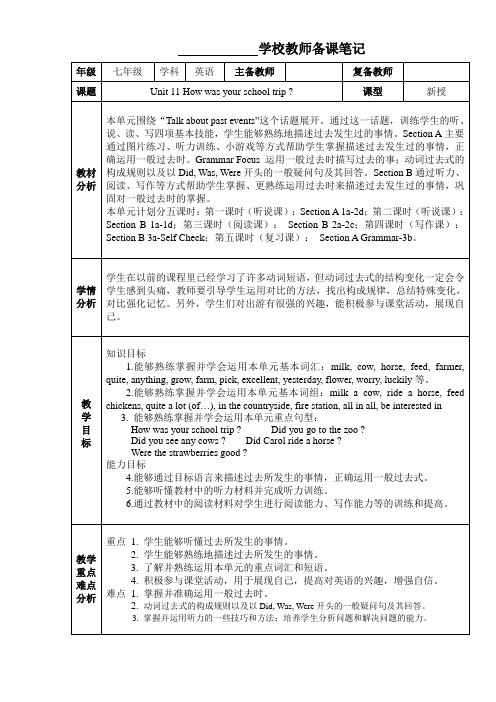
新授
教材分析
本节课是在已学过的一般现在时态的基础上过渡到一般过去时。学生通过听说操练来掌握本课时的重点单词、短语、和语法。本节课有3个模块:模块一围绕“school trip”这一话题展开词汇教学及一般过去时(1a);模块二围绕“Carol’s visit to the farm”进行听说训练,听力(1b 2a 2b)、口语(1c 2c);模块三围绕“Peter’s and Eric’s trips”(2d)以结对活动形式进行操练。
Did they pick any strawberries on the farm ?
Yes, they did .
展开Pair work活动,完成l c部分口语交际的教学任务
自编对话,全班互查,错误更正
学生展开Pair work活动,主要操作和练习使用一般过去时的各种句式进行问答
熟练掌握目标语言
学情分析
学生在以前的课程里已经学习了许多动词短语,但动词过去式的结构变化一定会令学生感到头痛,教师要引导学生运用对比的方法,找出构成规律,总结特殊变化,对比强化记忆。另外,学生们对出游有很强的兴趣,能积极参与课堂活动,展现自己。
教
学
目
标
知识目标
1.能够熟练掌握并学会运用本单元基本词汇:milk, cow, horse, feed, farmer, quite, anything, grow, farm, pick, excellent, yesterday, flower, worry, luckily等。
课型
新授
教材分析
本单元围绕“Talk about past events”这个话题展开。通过这一话题,训练学生的听、说、读、写四项基本技能,学生能够熟练地描述过去发生过的事情。Section A主要通过图片练习、听力训练、小游戏等方式帮助学生掌握描述过去发生过的事情,正确运用一般过去时。Grammar Focus运用一般过去时描写过去的事;动词过去式的构成规则以及以Did, Was, Were开头的一般疑问句及其回答。Section B通过听力、阅读、写作等方式帮助学生掌握、更熟练运用过去时来描述过去发生过的事情,巩固对一般过去时的掌握。
- 1、下载文档前请自行甄别文档内容的完整性,平台不提供额外的编辑、内容补充、找答案等附加服务。
- 2、"仅部分预览"的文档,不可在线预览部分如存在完整性等问题,可反馈申请退款(可完整预览的文档不适用该条件!)。
- 3、如文档侵犯您的权益,请联系客服反馈,我们会尽快为您处理(人工客服工作时间:9:00-18:30)。
Unit 11 What do you think of game shows? 学习目标课后习题Unit 11 What do you think of game shows?一. 词汇A)根据句意和首字母提示完成句子。
1. Tony doesn’t like soap opera. How a_______ you?2. I can’t s______ talk shows. I never watch them.3. They don’t m_______ game shows.4. Yang Li asks Maria to put her o________ in next month’s magazine.5. I enjoyed reading this m________.B)根据图示提示完成句子。
6. The boy_______________()sports shows.7. Do you____________()with me?8. She___________()her mother yesterday.9. There are many__________()shows on TV.10. This is a nice____________()ring。
二.选择填空( ) 1. What ______ Maria think of Ann?A. doesB. doC. is( ) 2. Henry doesn’t like the movie. I don’t _______.A. tooB. eitherC. also( ) 3. Do you enjoy ________ to classical music? Yes, I do.A. listeningB. listenC. listens( ) 4. “_________ shall we meet in the park?” “ What about half past six?”A. WhatB. WhereC. When( ) 5. My sister didn’t have a great summer. I didn’t have a great summer, _______.A. tooB. eitherC. also( ) 6. I don’t like Jackie. _______, I don’t like action movies.A. In factB. At factC. On fact( ) 7. Mrs. Smith always wears ________ sunglasses.A. aB. oneC. a pair of( ) 8. The sports report is really boring. I can’t _______ it.A. mindB. likeC. stand( ) 9. My friend bought new earrings. She likes _____ very much.A. itB. themC. me( ) 10. ---What do you ______ the ring?--- I like the ring.A. think ofB. likeC. think三.情景交际选择不能回答下列问句的选项。
1. What do you think of Barbie's hat?A. I love it.B. Who can stand it?C. She got it this morning.D. It’s cool.2. Do you like my new scarf?A. Yes, I do.B. I don’t mind it.C. It’s beautifulD. I’m fine.3. What does everyone think of Amanda?A. I don’t knowB. I don’t either.C. They like her.D. She’s unfriendly.4. What's Melanie like?A. It’s cool.B. She likes expensive things.C. What a comedian.D. She’s great.5. Where did you go this summer?A. I’m coming at 3:00.B. I went to the beach.C. Just stayed at home.D. Everywhere!四、Change the following sentences.句型转换。
1. She loves soap operas.(变成一般疑问句,并作否定回答)2. Sally went to bed early last night.(变成否定句)3. Dick doesn't mind talk show.(变成What 引导的问句)4. Rick's mother loves sitcoms.(变成否定句)5. I wear colorful clothes because I want to be young and beautiful.(对划线部分提问)五.完形填空A man was sitting in the doctor’s office. He was telling the doctor about his1 . “I like football, doctor,” he said, “Please help me. My life has2 been a good one since I became3 in football and it is getting worse and worse. I can’t even4 well at night. When I close my5 , I’m out there in the football field6 after a flying ball. When I wake up, I’m more7 than I was when I went to bed. What am I going to do?”The doctor sat back and said, “First of all, you 8 to do your best not to dream about football. Before you are falling asleep, try to 9 about something else. Try to think that you are at a party and someone is going to give you severalmillion dollars.”“Are you crazy(发疯的)?”The man shouted, “I’ll 10 the ball!”()1. A. problem B. family C. sport D. journey ()2. A. always B. already C. never D. often()3. A. interested B. careful C. deep D. strong()4. A. work B. play C. do D. sleep()5. A. doors B. windows C. books D. eyes()6. A. looking B. playing C. running D. waiting()7. A. worried B. tired C. surprised D. pleased()8. A. want B. hope C. have D. decide()9. A. hear B. write C. talk D. think()10. A. miss B. play C. catch D. pass六. 阅读理解。
ALast Monday John went to downtown. After John spent a long time shopping downtown, he got very hungry. Across the street the re was a McDonald’s. He didn’t usually eat at fast food restaurants and didn’t know what to order(点菜). When he looked at the menu, it was hard for him to make a decision(决定). Not only there were ten similar(类似的)types of hamburger dinners, but there were also fish and chicken dinners. He didn’t know what to choose. He thought of asking the cashier for help, but she didn’t look very friendly. At last he chose a small chicken meal. “With so many choices, it’s not very fast food!” he thought.Choose the best answer.(选择正确答案。
)()1. Why did John go to downtown last Monday?A. He went shopping.B. He bought some clothes.C. He went to eat at the fast - food restaurants.D. He bought fast food.()2. Why didn’t John know what to order at McDonald’s?A. He doesn’t like fast food.B. He doesn’t mind fast food.C. He can’t stand fast food.D. He doesn’t eat there very often.()3. What made it hard for him to decide what to eat?A. He was in a hurry.B. He wasn’t very hu ngry.C. There were too many choices.D. The menu is difficult to read.()4. Why didn’t he ask the cashier for help?A. He doesn’t like the cashier.B. He can’t stand the cashier.C. The cashier is busy.D. The cashier looked unfriendly. ()5. Why does John think the fast food is not fast?A. It takes him a long time to decide what to order.B. The cashier didn’t bring him his meal for an hour.C. The cashier is not friendly.D. The restaurant is too far from the downtown.BChoose the best answer.(选择正确答案。
